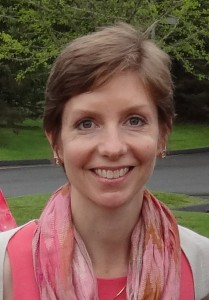Kuenzli to Research European Artist through Learned Societies Fellowship

Associate Professor of Art and Art History Katherine Kuenzli has won a prestigious American Council of Learned Societies fellowship for next year. The award will support her work on Henry van de Velde, a European artist whose aesthetic helped shape modernism.
The fellowship – one of 65 awarded this year to scholars in the humanities and humanistic social sciences – provides salary replacement for faculty who are embarking on six to 12 months of full-time research and writing.
“I am thrilled to have the support for and acknowledgement of my work,” Kuenzli said. “I began (the project) in 2009 and will devote next year to completing a full draft of a book manuscript – having the energy and train of thought will be essential.”
She said the project, “Designing Modernsim: Henry van de Velde from Neo-Impressionism to the Bauhaus“ emerged out of her first book, on “intimate modernism” in Paris in the 1980s. While that book examined paintings and prints artists created for private homes, theater stages, and street corners, Kuenzli’s new work broadens that scope to include not just painting, but also the applied arts and architecture. She’s studying the internationalization of art around 1900 and attempts to broaden the public for art, while maintaining a high level of formal and intellectual sophistication. The book uncovers a forgotten chapter in the emergence of abstraction, which has been understood as painting-specific; she hopes to demonstrate how “abstract aesthetics emerged out of an attempt to coordinate the arts, and to unify art and life.”
Matthew Goldfeder, director of the ACLS fellowship programs, said that this year’s fellows were “chosen for their potential to create new knowledge that will improve our understanding of the world and its diverse cultures and societies.”
The fellows represent more than 50 colleges and universities and an array of disciplines, including music, philosophy, art history and sociology. More than 1,000 applications were received for this year’s fellowship cycle.
Kuenzli’s project on van de Velde will explore how the painter, designer and architect – who worked in Belgium, France and Germany in the decades before WWI – developed an abstract formal vocabulary that proved seminal to both painterly modernism and an activist, engaged avant-garde.

